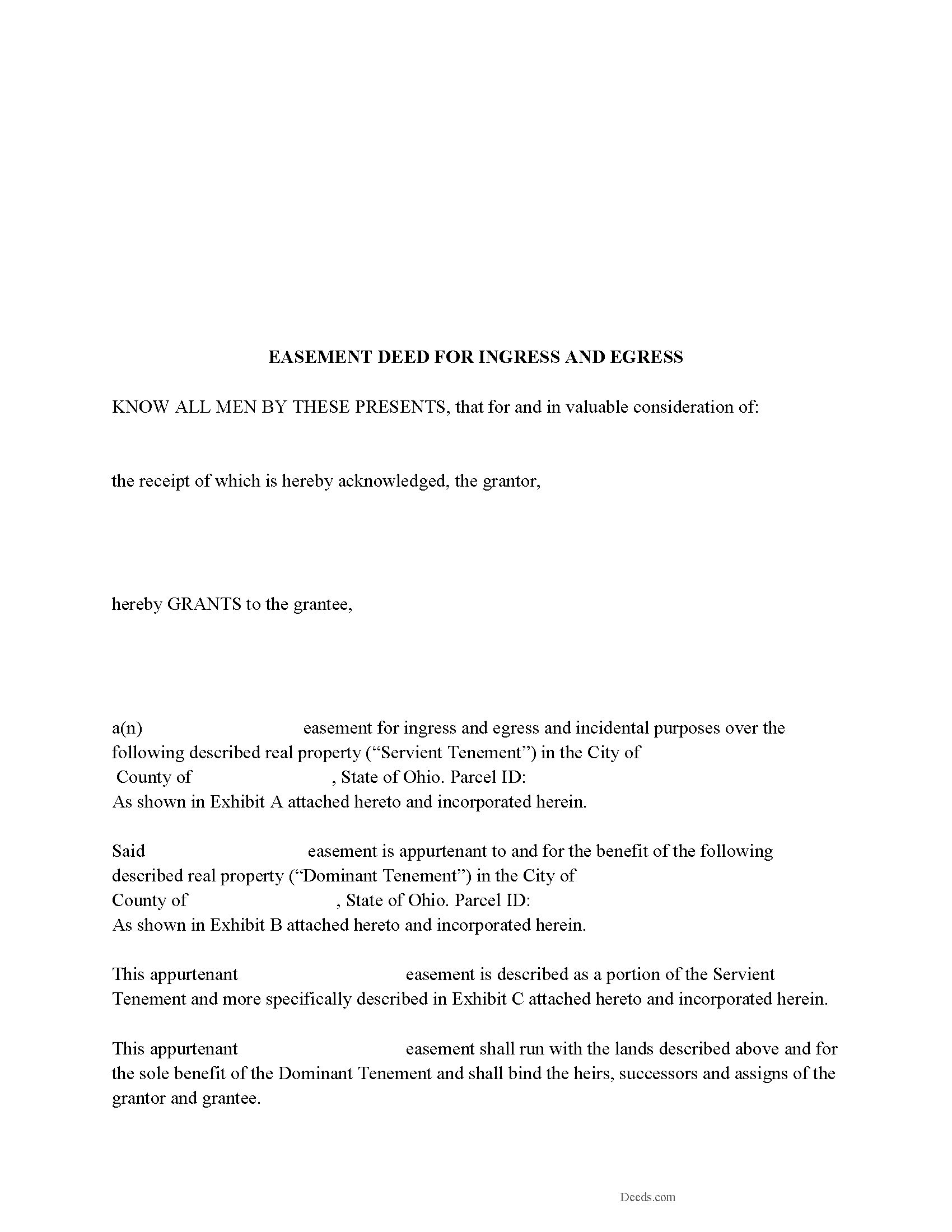Ohio Easement Deed
County Specific Legal Forms Validated as recently as December 18, 2025 by our Forms Development Team

About the Ohio Easement Deed

How to Use This Form
- Select your county from the list on the left
- Download the county-specific form
- Fill in the required information
- Have the document notarized if required
- Record with your county recorder's office
What Others Like You Are Saying
“I like the content and the availability to conduct valuable business online”
— Bobby Y.“I like the service very much, it's easy and fast, I'm really happy with the service.”
— Alma S.“Ordered the Ohio Land Contract forms for Jefferson County. It was an awesome purchase for $28 bucks.…”
— Kevin B.“Very easy thank you”
— cynthia k.“I was happy to have my payment cancelled when no information was found. And I was given a link to co…”
— Linda R.
An easement is created to give one person the use of another person's real property for a specific purpose. Easements are granted for various reasons, which may include a right-of-way, for utility purposes, or for environmental reasons. The easement deed is the legal instrument which creates the right of use. In a conveyance of real estate or of any interest therein in Ohio, all easements, rights, privileges, and appurtenances belonging to the granted estate are included in the conveyance, unless the deed states otherwise (5302.04).
Any person may grant a solar access easement for the purpose of ensuring adequate access of a solar energy collection device to sunlight. Solar access easements are created in writing and are subject to the same conveyancing and recording requirements as other easements (5301.63). Conservation and agricultural easements may also be granted in Ohio. Conservation and agricultural easements are also created in writing and are subject to the same requirements as other instruments conveying interests in land (5301.68).
An easement deed is a real property instrument which must be signed by the grantor in order to be recorded. The grantor's signature should be original and must also be acknowledged by the grantor before a judge or clerk of a court of record in Ohio, a county auditor, a county engineer, notary public, or mayor. The official acknowledging the deed must certify the acknowledgment and sign their name to the certificate of the acknowledgment. A county recorder may not take acknowledgments of deeds (5301.01). An easement deed that has been executed and acknowledged in another state in conformity with the laws of such state or in conformity with Ohio laws will be valid as if executed within Ohio (5301.06).
Until an easement deed is recorded or filed in the county recorder's office, it will be fraudulent insofar as it relates to a subsequent bona fide purchaser who has, at the time of purchase, no knowledge of the existence of the former deed (5301.25). A recorded easement deed will provide constructive notice of the contents of the instrument to all persons. Deeds are recorded in the office of the county recorder in the county where the property is located.
(Ohio Easement Deed Package includes form, guidelines, and completed example)
Important: County-Specific Forms
Our easement deed forms are specifically formatted for each county in Ohio.
After selecting your county, you'll receive forms that meet all local recording requirements, ensuring your documents will be accepted without delays or rejection fees.
How to Use This Form
- Select your county from the list above
- Download the county-specific form
- Fill in the required information
- Have the document notarized if required
- Record with your county recorder's office
What Others Like You Are Saying
“I like the content and the availability to conduct valuable business online”
— Bobby Y.“I like the service very much, it's easy and fast, I'm really happy with the service.”
— Alma S.“Ordered the Ohio Land Contract forms for Jefferson County. It was an awesome purchase for $28 bucks.…”
— Kevin B.“Very easy thank you”
— cynthia k.“I was happy to have my payment cancelled when no information was found. And I was given a link to co…”
— Linda R.Common Uses for Easement Deed
- Transfer property between family members
- Add or remove names from property titles
- Transfer property into or out of trusts
- Correct errors in previously recorded deeds
- Gift property to others